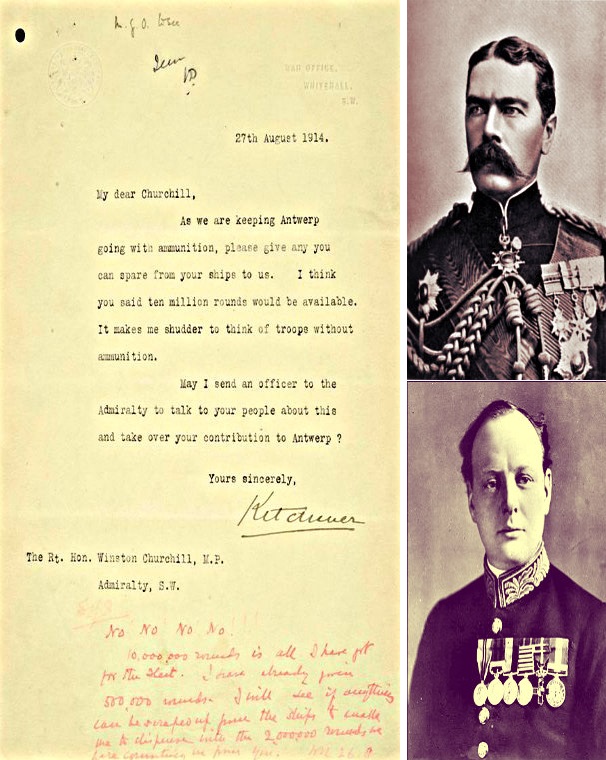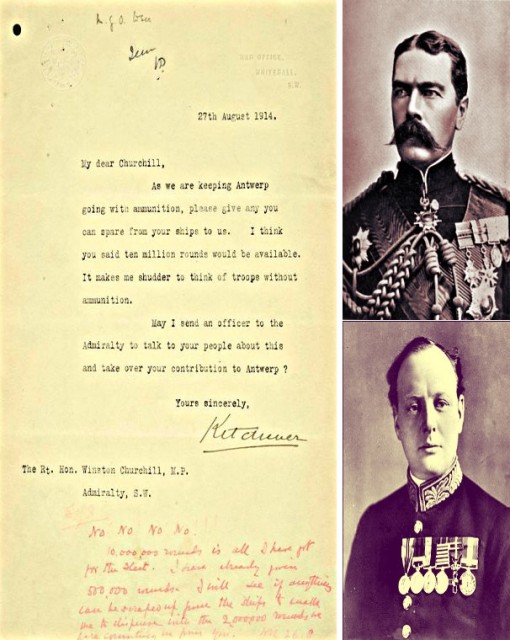The 100-year-old desperate letter Lord Kitchener sent to Churchill during the outbreak of the Great War recently surfaced and showed how vulnerable Britain was that time.
The said desperate letter was written on a note paper bearing the heading of the War Office and was dated August 27, 1914. In it, Army Chief Lord Kitchener wrote his plea to Winston Churchill – who was the First Lord of the Admiralty, the Royal Navy’s civil and political head – asking him for more munitions as the ‘troops are without ammunition’.
However, below Lord Kitchener’s desperate letter, Churchill wrote his reply — a vehement ‘no, no, no, no’.
Churchill went on to say that he had already given 500,000 rounds for the British Army. To rub more salt to the wound, Churchill even added that he would see if he and his men could scrape up some more from their ships to allow them to come up with the 2,000,000 rounds the Army was supposed to supply them with.
The said desperate letter and correspondence between the two officials showed two things. Firstly, that Britain was very unready when the First World War broke out and this was evident in the lack of munitions. Secondly, it just stressed out that there was no love lost between Lord Kitchener and Churchill.
Winston Churchill, reportedly, despised the army chief. In return, Lord Kitchener regarded the former ‘a bit of an upstart’.
The desperate letter and terse correspondence between the two WWI figures was discovered by the Forces War Records, a military genealogy website, while it was carrying out a search for one of its members. The note was found in the National Archives.
In his statement, managing director of the Forces War Records, Tim Hayhoe, said that the desperate letter is a vital document pertaining to the two important figures of the Great War. He went on to say that though the desperate letter was written close to the outbreak of the Great War, it showed that Britain was in a desperate predicament due to its lack of resources specifically ammunition.
Hayhoe articulated that Britain entered the war on August 4, 1914 when Germany broke the agreement not to invade Belgium. The country did send approximately 240,000 British soldiers to Belgium but, Hayhoe conferred, that the troops were a token force. The combination of the British and Belgium troops was greatly outnumbered by the Germans one to five.
The urgency felt in the desperate letter Lord Kitchener sent to Churchill clearly came from that. Yet, the two, the head of the British Army and the Navy, were still arguing over their ammunition allocation. Not only that — they were also fighting over who was supplying who.
Hayhoe ended by saying that Britain has gone on to win the war. Yet people do not realize the close brush the country had to defeat.
When 1916 rolled in, Churchill returned to the army and was given the rank of a lieutenant colonel of the Royal Scot Fusiliers. That very same year saw Lord Kitchener’s death. He died when the ship that was suppose to take him to Russia for negotiations was hit by a German mine.

